- Home
- Michael Byrnes
The Sacred Bones Page 3
The Sacred Bones Read online
Page 3
When he had finished, he stood and buttoned the top button of his tan suit jacket.
Two Israeli soldiers watched scornfully as he made his way through the exit, staring at his rolling suitcase as if it contained plutonium. To Razak, it was indicative of a much broader tension that defined this place and he ignored them.
Outside the international terminal he was greeted by a Waqf representative-- a tall young man with dark features who led him to a white Mercedes 500.
"Assalaamu 'alaykum."
"Wa 'alaykum assalaam," Razak replied. "Is your family well, Akil?"
"Thank you, yes. An honor to have you back, sir."
Akil took his bag and opened the rear door. Razak dipped into the air-conditioned interior, and the young Arab took his place behind the wheel.
"We should be in Jerusalem in under an hour."
* * *
Approaching the towering ancient limestone block wall that wrapped around Old Jerusalem, the driver turned into a parking lot and reclaimed his reserved spot. They would have to make it the rest of the way on foot since the Old City, with its prohibitively narrow streets, was off-limits to most vehicular traffic.
Outside the Jaffa Gate, Razak and the driver were queued into a long line by heavily armed IDF guards. Nearer the opening, they were subjected to a thorough body pat down while Razak's bag was inspected and passed through a portable scanner. Then came an exhaustive verification of their credentials. Finally, they took turns being funneled through a metal detector, all the while being monitored by a set of surveillance cameras mounted high up on a nearby pole.
"Worse than ever," Akil remarked to Razak, relieving him of his luggage. "Pretty soon we'll be locked out all together."
They went through a narrow, L-shaped tunnel-- a design from centuries earlier meant to slow marauding attackers-- and emerged into the busy Christian Quarter. Climbing the sloped cobblestone walkways into the Muslim Quarter, Razak breathed in the complex aromas of the nearby Souk-- fresh bread, spicy meat, tamarind, charcoal, and mint. It took them fifteen minutes to reach the high staircase on Via Dolorosa that climbed up to the Temple Mount's elevated northern gate. There, a second security check was required by the IDF, though not nearly as intrusive as the first.
As Akil led him across Temple Mount's expansive esplanade, Razak could hear the raucous cries of protestors down near the Western Wall Plaza. He didn't need to see them to know that Jerusalem's district police and reinforcements from the IDF would be there in large numbers, holding the crowds at bay. Focusing on the spectacular mountainous panorama afforded by the Temple Mount's high vantage point, he tried to block out the distressing sounds.
"Where will we be meeting?" Razak asked.
"Second floor of the Dome of Learning building."
Taking his bag, Razak thanked Akil, leaving him at a freestanding archway and headed toward a squat, two-story building situated between the sacred Dome of the Rock and El-Aqsa Mosques.
Entering the northern door, he ascended a flight of stairs and strode down a narrow corridor to a private room where he could already hear the voices of the Waqf officials awaiting him.
Inside, nine Arab men-- middle-aged and older-- were convened around a heavy teak table. Some wore traditional kaffiyeh head wraps and business suits; others had opted for turbans and colorful tunics. When Razak entered, the room fell into a hush.
At the head of the table, a tall bearded Arab wearing a white headdress stood and raised a hand in greeting.
Making his way over to him, Razak raised his own. "Assalaamu 'alaykum."
"Wa 'alaykum assalaam," the man responded with a smile. Farouq bin Alim Abd al-Rahmaan al-Jamir had presence. Though his real age was unknown, most would correctly place him in his mid-sixties. Lucid gray eyes revealed the burden of many secrets, but showed little of the man within. A thick scar ran across his left cheek and he wore it proudly as a reminder of his days on the battlefield. His teeth were unnaturally symmetrical and white, obviously replacements.
Ever since Muslims regained control of the Temple Mount in the thirteenth century, the Waqf had managed this sacred shrine and a "Keeper" had been appointed as its supreme overseer. That responsibility, entrusting all matters concerning the sanctity of the site, now lay with Farouq.
As they took their seats Farouq reacquainted Razak with the men around the table then quickly got to the matter at hand.
"I make no apology for summoning you here on such short notice." Farouq stared round the table, while tapping a ballpoint pen against the polished teak surface. "You all know about the incident last Friday."
A male servant bent to pour Razak a cup of spicy Arabian coffee-- qahwa.
"Enormously troubling." Farouq continued. "Sometime in the late evening, a group of men broke into the Marwani Mosque. They used explosives to access a hidden room behind the rear wall."
The fact that the crime had occurred on a Friday, when Muslims from all over Jerusalem would gather on Temple Mount for prayer, was particularly troublesome to Razak. Perhaps the perpetrators meant to strike fear into the Muslim community. He settled into his chair, trying to compute the audacity it would take to desecrate such a sacred site. "For what purpose?" He sipped his coffee slowly, letting the smell of cardamom fill his nostrils.
"It seems they have stolen an artifact."
"What kind of artifact?" Razak preferred forthright answers.
"We'll get to that later," Farouq said dismissively.
Not for the first time Razak wished the Keeper didn't play his cards so close to his chest. "Professional job then?"
"It appears so."
"Did the explosions damage the mosque?"
"Luckily, no. We immediately contacted a structural engineer. So far it seems the damage is contained to the wall."
Razak frowned. "Any idea who could have done this?"
Farouq shook his head.
"It was the Israelis I tell you!" one of the elders burst out, quivering with rage, his lower lip dramatically curled.
All heads turned to the old man. His eyes shifted away and he eased himself back into his seat.
"That is not certain," Farouq firmly cut in. "Though it's true that eyewitnesses reported an Israeli Black Hawk was used to transport the thieves."
"What?" Razak was stupefied.
Farouq nodded. "It landed in the esplanade outside the El-Aqsa Mosque and took them away."
"But isn't that restricted airspace?"
"Absolutely."
Though he wouldn't admit it, Razak was impressed that anyone could pull off such an operation, especially in Jerusalem. "How?"
"We don't have details." Farouq's pen resumed its tapping. "All we know is that the helicopter was spotted over Gaza minutes after the theft. We're awaiting a full report from the IDF. But let's not forget that thirteen Israelis were killed during the attack and many more injured," Farouq reminded the assemblage. "Policemen and IDF soldiers. To assume Israelis were responsible...for now that wouldn't seem to make sense."
Another elder spoke up. "This situation's very complicated. Clearly this theft has occurred within our jurisdiction. However, that so many IDF soldiers were killed does matter greatly." He spread his hands and paused. "The Israelis have agreed to keep this quiet, but ask that we cooperate in sharing all information uncovered through our internal investigations."
Razak fingered his cup and looked up. "I'm assuming the police have already begun preliminary investigations?"
"Of course," Farouq interjected. "They arrived minutes after the episode occurred. Problem is they've yet to present any definitive evidence. We suspect important facts are being withheld. That's why we've summoned you. Confrontation seems inevitable."
"If only-- " Razak began.
"Time's limited," another Waqf member with a thick head of silver hair overrode him. "Both sides are concerned it won't be long before the media starts drawing its own conclusions. And we all know what that will lead to." His grave eyes circled the table to draw sup
port. "Razak, you know how fragile our role is here in Jerusalem. You see what's happening outside on the streets. Our people rely on us to protect this place." He stuck out an index finger and tapped it on the table twice. "There's no knowing how they'll react. Unlike most of us," he eyed the first outspoken elder, still purple from rage, "they will assume the Israelis are responsible."
Farouq came in again. "You can well imagine that Hamas and Hezbollah are both anxious to lambaste the Jews for this." His face darkened. "They're asking for our support implicating the Israelis to further Palestinian liberation."
The situation was far worse than Razak had imagined. Tensions were already running high between the Israelis and Palestinians. Both Hamas and Hezbollah had garnered much support over the past few years in their efforts to outwardly oppose Israeli occupation and this incident would surely bolster their political agenda. Razak tried to not think about even more drastic consequences that were likely to occur. The Waqf was now stuck in the middle of a very precarious political situation-- one that felt impossibly fragile to Razak. "So what do you wish of me?" he asked, looking round the table.
"Determine who stole the relic," replied the soft-toned elder. "We need to know who committed this act so justice can be served. Our people deserve an explanation as to why such a sacred place has been so maliciously violated."
In the ensuing silence Razak could hear the taunting, muffled sounds of protestors through the window, like voices from the grave. "I'll do whatever's necessary," he assured them. "First I'll need to see where this happened."
Farouq rose to his feet. "I'll take you there now."
4.
VATICAN CITY
Charlotte Hennesey was battling the unforgiving eight-hour time difference, and three espressos earlier that morning hadn't helped to settle her.
As instructed, she was waiting in her guest suite until summoned. Unlike the limousine and first-class service that had whisked her from Phoenix to Rome, her accommodation at the Vatican City's Domus Sanctae Marthae residence hall was austere. White walls, simple oak furniture, twin bed and nightstand, though she did have her own bathroom and a small refrigerator.
Seated at the sun-filled window, she gazed out over the tiled roofs of Rome's western sprawl. Having finished her novel on the plane-- Anne Tyler's Saint Maybe-- she'd now had to settle for the English edition of L'Osservatore Romano, reading it from cover to cover. Sighing, she set the paper down and looked over at the nightstand's digital alarm clock-- 3:18.
She was anxious to get to work, but wondered what purpose an American geneticist could possibly serve here. As the head of research and development at BioMapping Solutions, Charlotte typically made off-site visits to pharmaceutical and biotech companies looking to apply the latest discoveries in the human genome to their research.
It was her boss, BMS founder Evan Aldrich, who had taken the call almost two weeks ago from a Vatican cleric named Father Patrick Donovan. Having heard the priest's compelling proposal, Aldrich had volunteered her services for a highly secretive project. Few things could divert Evan Aldrich from his work, especially when the request required him to hand over his best researcher.
Clearly this was one of them.
At thirty-two, Charlotte was a lithe five-nine with striking emerald green eyes and a smooth, healthily tanned face framed by shoulder length curls of chestnut hair. With a rare balance of intellect and charm, she'd become her company's chosen spokesperson for an industry typified by gray scientists. Human genetics was often misunderstood and always controversial. With BMS aggressively promoting its latest gene-mapping technology, the right public image was important.
Recently she had added media appearances to her arsenal of talents-- talk shows and news programs. Aldrich had told her that the Vatican priest mentioned seeing one of her most recent interviews concerning the reconstruction of maternal lineage through mapping mitochondrial DNA, prompting his request for her services.
Now that her time was split between research and public relations, she wondered exactly what role she'd be asked to play here. After all, the conservative papacy was surely not one of her biggest supporters.
Her thoughts drifted back to Evan Aldrich.
Aldrich had abruptly shifted his career ten years ago, abandoning his secure tenure as a Harvard professor of genetic science to enter the uncertain world of business. And he had handled the switch brilliantly. Not for the first time, Charlotte mused about what made Evan tick. Not money, though when BMS eventually went public he would make a great deal of it. What really drove the man was his sense of purpose, his belief that the work they did and the choices they made really mattered. It was his passion and genuine charisma that first attracted her to him. The fact that she thought he looked like a movie star didn't hurt either.
Almost a year ago, she and Evan had begun dating, both very cautious about the potential work-related conflicts such a relationship might bring about. But if there could exist a natural fit between two people, Charlotte had certainly found it-- like the inevitable laws of physics she found herself hopelessly drawn to him. Only four months ago, things between them seemed perfect.
Then fate decided to throw a curveball at her.
A routine blood test taken during her annual physical detected abnormally high protein levels in her blood. Further testing followed that included a painful bone biopsy. Finally came the devastating diagnosis: multiple myeloma.
Bone cancer.
At first, she was angry. After all, she was practically a vegetarian, rarely drank, and exercised like a fiend. It just didn't make sense, especially because at the time, she felt perfectly fine.
That wasn't the case now. Just a week earlier, she began taking Melphalan-- her first round of low-dose chemotherapy. Now she felt like she was battling a permanent hangover, complete with intermittent waves of nausea.
She didn't have the heart to tell Evan. Not yet, at least. He had already been talking about a more permanent future, even kids. None of that seemed possible now and it crushed her. Over the past few weeks, she had grown more despondent. In all fairness to him, she needed to be absolutely certain that she would be among the ten percent who actually beat this disease before she could commit to anything more serious.
A discreet knock pulled Charlotte from her thoughts.
Reaching the door in four strides, she opened it to see a bespectacled bald man barely her height, dressed in a black suit and shirt. His complexion was smooth and pale. Maybe in his late forties or early fifties, she guessed. Her eyes were immediately drawn to the white priest collar.
"Good afternoon, Dr. Hennesey. I'm Father Patrick Donovan." His English was flavored with an Irish brogue. Smiling pleasantly, he extended a thin hand.
My Vatican admirer, she thought. "A pleasure to meet you, Father."
"I so much appreciate your patience. I apologize for the delay. Shall we go?"
"Yes, of course."
5.
TEMPLE MOUNT
Deep beneath Temple Mount, Razak and Farouq stood amidst the rubble-strewn floor of the Marwani Mosque. As the Keeper had indicated, the damage to the site had been considerable, yet contained. Pole-mounted spotlights had been erected to illuminate a gaping hole in the rear wall about a meter-and-a-half in diameter. On seeing it, Razak felt his stomach twist into a knot.
The first time he had seen this place was in the late 1990s. Back then, rubble and debris had completely filled the space, floor to ceiling. But that was before the Israeli government had allowed the Waqf to initiate excavation and restoration. In exchange, Jewish archaeologists had been permitted to excavate the Western Wall tunnel-- an underground passage far beneath the buildings of the Muslim Quarter, connecting the southern Western Wall Plaza to the Via Dolorosa on the embankment's northwest corner. As usual it was a compromise that wasn't without bloodshed. Riots had broken out between Palestinians and Israelis opposing the excavations, resulting in the deaths of over seventy soldiers and civilians, including Razak's closest fr
iend, Ghalib, who vehemently opposed Israeli digging beneath his home that abutted the Temple Mount's western retaining wall.
Some Muslims had clung to the belief that a demon called the Jin had deliberately filled this underground room with rubble to deter entrance. And now that its restoration was nearing completion, Razak couldn't help but feel a malevolent presence still lurked here in the shadows.
Approaching the aperture, he ran his fingers along its jagged edge, feeling a gummy residue. He peered into the secret chamber beyond where the rubble was minimal.
Farouq appeared beside him holding a piece of masonry and handed it to Razak. "See this?" He indicated a smooth arc that ran along one edge of the brick. "The Israelis found a drill the thieves left behind, used to make cores that were then packed with explosive."
Razak examined the brick. "How could explosives be smuggled into the heart of Jerusalem, past all the checkpoints?"
"Explosives and guns. These people were smart." Farouq leaned through the hole and peered into the chamber. "I didn't want to mention it in front of the others, but this seems to suggest that someone on the inside helped them. Perhaps the Jews did have something to do with this."
Razak wasn't so sure. "You said the police have already seen this?"
"The police and the IDF's intelligence people. Studied it for two solid days following the theft."
Their thoroughness didn't surprise Razak.
"We've been awaiting a full report," Farouq added. "It has yet to come."
Both men climbed through the hole into the space beyond.
Additional pole lights illuminated the inner chamber clearly carved from Mount Moriah's soft limestone bedrock with thick earthen pillars supporting its rocky ceiling. The walls were bare of any ornamentation. Here the stagnant air still smelled of explosives.
Razak turned to face the Keeper. "Did you know about this chamber before?"
"Absolutely not. Our excavations were contained within the mosque itself. Any unauthorized digging would have been strictly forbidden."

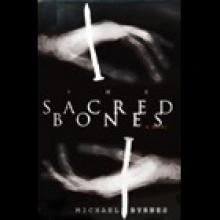 The Sacred Bones
The Sacred Bones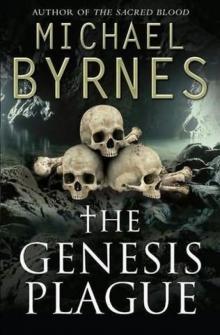 The Genesis Plague (2010)
The Genesis Plague (2010)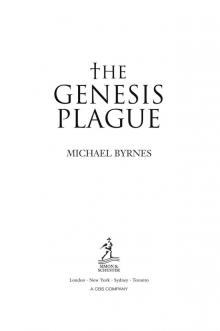 The Genesis Plague
The Genesis Plague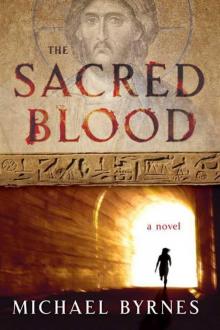 The Sacred Blood
The Sacred Blood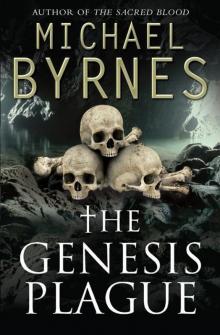 The Genesis Plague tf-1
The Genesis Plague tf-1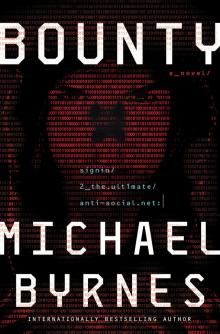 Bounty
Bounty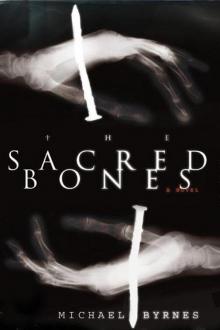 Sacred Bones : A Novel
Sacred Bones : A Novel